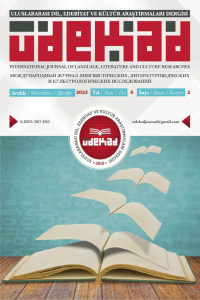Abstract
Can Eryümlü’s novel “Son Antlaşma” (The Last Treaty), published in 2001, is a work that should be considered, with both its fiction and its content, in terms of the concepts of “reconstruction of history, ukronia, utopia and fantasy” in the Turkish novel of the Republican period. The novel consists of a complex series of events overlapping in time and space. A group of scientists produced a semi-organic computer called Odysse in 1961. This computer enables travel in both time and space. Starting from 1961, scientists have been using the Odysse to try to reconstruct “man and civilization” by going back and forward in history. However, no matter which time period they go to, every job they do and every action they take coincides with the events in the historical line. Eryümlü brings a different, fictional perspective to the known historical flow. Ultimately, the source of civilization and belief systems in the world is again shown to be as humans. These points in the novel overlap with the concept of “ukronia”, which is the subject of our study. Since there have been conceptual studies on the term ukronia, an in-depth examination of the place and history of the concept in Turkish and world literature has not been made in this study. The concept of “ukronia”, which is discussed in general terms, will be discussed as a “hypothetical view of history” in this study. The novel was examined in terms of the concepts of “science fiction, fantasy, utopia” as well. In addition, the novel Son Antlaşma (The Last Treaty) was examined thematically and the content of the work was given in general terms.
Keywords
References
- Canton, N. (Yapımcı) ve Zemecki, R. (Yönetmen) (1985). Back to the Future. [Sinema filmi]. ABD: Universal Pictures.
- Eryümlü, C. (2014). Son Antlaşma. Yankı Yayınları.
- Eryümlü, C. (2001). Son Antlaşma. Alt Kitap Yayınları (e-kitap)
- Gür, M. (2023). Türk Edebiyatında Ükronya - Başka Bir Tarihi Hayal Etmek. Günce Yayınları.
- Gür, M. (2022). Edebî Bir Tür Olarak Ükronya ve Alternatif Bir Tarihin Anlatısı: İzmihlâl. Söylem Filoloji Dergisi, 7 (3), 711-725.
- Kutsal Kitap (2014). Yeni ve Eski Antlaşma (Tevrat, Zebur, İncil). Yeni Yaşam Yayınları.
- Parkers, W. F. (Yapımcı) ve Wells, S. (Yönetmen) (2002). The Time Machine [Sinema filmi]. ABD: Warner Bros Pictures.
- Von Daniken, E. (1994). Tanrıların Arabaları. çev. Zeki Okar. Cep Kitapları.
Abstract
Can Eryümlü’nün 2001 yılında yayınladığı Son Antlaşma romanı gerek kurgusu gerekse içeriği ile Cumhuriyet dönemi Türk romanında “tarihin yeniden kurgulanması, ükronya, ütopya ve fantastik” kavramları açısından ele alınabilecek bir eserdir. Roman, zamanda ve mekânda üst üste binen karmaşık olaylar dizisinden oluşur. Bir grup bilim insanı 1961’te Odysse adını verdikleri yarı organik bir bilgisayar üretirler. Bu bilgisayar hem zamanda hem de mekânda yolculuğu mümkün kılar. Bilim insanları 1961’den başlayarak Odysse’yi kullanıp tarihte geçmişe ve ileriye doğru giderek “insanı ve medeniyeti” yeni baştan kurgulamaya çalışırlar. Ancak hangi zaman dilimine giderlerse gitsinler yaptıkları her iş, uyguladıkları her eylem tarih çizgisindeki olaylar ile örtüşür. Eryümlü, bilinen tarihî akışa farklı, kurgusal bir bakış açısı getirir. Nihayetinde dünya üzerindeki medeniyetin ve inanç sistemlerinin kaynağı yine insan olarak gösterilir. Romandaki bu noktalar çalışmamızın konusunu oluşturan “ükronya” kavramıyla örtüşür. Ükronya terimine dair kavramsal çalışmalar yapıldığı için bu çalışmada kavramın Türk ve dünya edebiyatındaki yerine ve tarihine dair derinlemesine bir inceleme yapılmamıştır. Genel hatlarıyla ele alınan “ükronya” kavramı bu çalışmada “tarihe varsayımsal bakış” olarak ele alınacaktır. Bunun yanı sıra “bilimkurgu, fantastik, ütopya” kavramları açısından da roman incelenmiştir. Ayrıca, Son Antlaşma romanı tematik olarak incelenmiş ve eserin içeriği genel hatlarıyla verilmiştir.
References
- Canton, N. (Yapımcı) ve Zemecki, R. (Yönetmen) (1985). Back to the Future. [Sinema filmi]. ABD: Universal Pictures.
- Eryümlü, C. (2014). Son Antlaşma. Yankı Yayınları.
- Eryümlü, C. (2001). Son Antlaşma. Alt Kitap Yayınları (e-kitap)
- Gür, M. (2023). Türk Edebiyatında Ükronya - Başka Bir Tarihi Hayal Etmek. Günce Yayınları.
- Gür, M. (2022). Edebî Bir Tür Olarak Ükronya ve Alternatif Bir Tarihin Anlatısı: İzmihlâl. Söylem Filoloji Dergisi, 7 (3), 711-725.
- Kutsal Kitap (2014). Yeni ve Eski Antlaşma (Tevrat, Zebur, İncil). Yeni Yaşam Yayınları.
- Parkers, W. F. (Yapımcı) ve Wells, S. (Yönetmen) (2002). The Time Machine [Sinema filmi]. ABD: Warner Bros Pictures.
- Von Daniken, E. (1994). Tanrıların Arabaları. çev. Zeki Okar. Cep Kitapları.
Details
| Primary Language | Turkish |
|---|---|
| Subjects | Modern Turkish Literature in Turkiye Field |
| Journal Section | Research Articles |
| Authors | |
| Early Pub Date | December 29, 2023 |
| Publication Date | December 31, 2023 |
| Submission Date | October 30, 2023 |
| Acceptance Date | December 21, 2023 |
| Published in Issue | Year 2023 Volume: 6 Issue: 2 |
* It is important for our referees to enter their fields of expertise in detail in terms of assigning referees in the process.
* The articles sent to our journal can only be withdrawn by giving reasons during the preliminary evaluation process. It is not possible to withdraw the articles that have started the evaluation process. Thank you for your understanding and we wish you good work.


